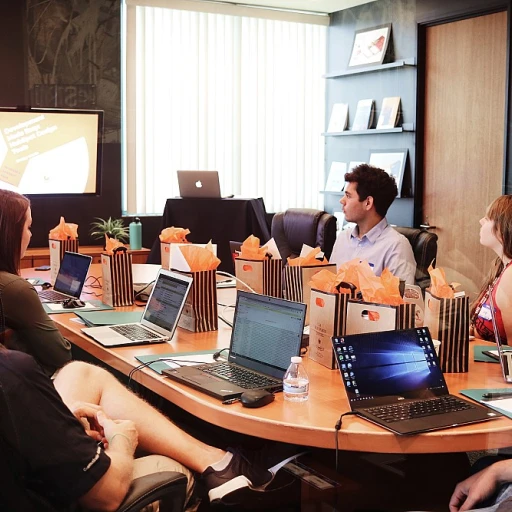
The Role of AI in Recruitment
The Power of Machine Algorithms in Recruitment
Artificial intelligence has revolutionized the recruitment landscape by providing innovative solutions to age-old problems. With the advent of advanced machine algorithms and data analytics, AI is now an integral part of the recruitment process, starting with candidate sourcing. The technology has taken on a crucial role in automating repetitive tasks and sifting through volumes of data to identify potential candidates. This not only saves time but also enhances the accuracy of matching candidates with job roles. Recruiters can now focus more on strategic decision-making rather than getting bogged down in the initial stages of recruitment. AI-driven tools harness the power of big data to analyze candidates' professional backgrounds, skills, and even predict their future performance. This empowers recruiters to make informed decisions, ensuring a higher quality of hire. As these tools evolve, we can anticipate even greater efficiency and effectiveness in sourcing candidates. As we will explore in subsequent sections, AI is also pivotal in refining sourcing tools and techniques, addressing biases, and enhancing the overall candidate experience. This transformation is setting new standards for the recruitment industry, paving the way for progressive changes in how talent acquisition is approached.Sourcing Tools and Techniques
Innovative Sourcing Technologies
In the rapidly evolving landscape of recruitment, technology advancements are constantly reshaping the ways companies identify and attract top talent. Artificial intelligence is playing a pivotal role in elevating sourcing tools and techniques, equipping hiring professionals with cutting-edge solutions that streamline the recruitment process. One of the most significant contributions of AI in candidate sourcing is its ability to automate repetitive and time-consuming tasks. This includes parsing resumes, screening potential candidates, and even suggesting potential matches for job vacancies based on a comprehensive analysis of data. These innovations allow recruiters to focus their efforts on more strategic aspects of hiring, rather than getting bogged down by administrative work. Additionally, AI-powered platforms offer sophisticated algorithms that scan a vast array of digital platforms and databases, efficiently locating individuals who may not actively apply for positions but could be excellent fits for an organization. This ability to reach and engage with passive candidates is a game-changer, adding a competitive edge to the sourcing process. It's not just about speed and efficiency. AI in sourcing can enhance precision by identifying skills and experiences that align closely with the job descriptions. This means hiring managers receive more qualified candidates, reducing the time to fill positions and improving overall job satisfaction. Though these tools are transformative, it's crucial for recruiters to maintain a human touch. As highlighted in the article's sections on overcoming bias and engaging passive candidates, the human element in recruitment involves empathy and the ability to connect on a personal level, aspects that AI cannot replace. Thus, a successful recruitment strategy combines the power of AI-driven sourcing tools with personalized candidate interactions for optimal outcomes.Enhancing Candidate Experience
Optimizing the Recruitment Journey with AI
Incorporating artificial intelligence into the recruitment process is not only revolutionizing how candidates are sourced but also reshaping their overall experience, creating a more seamless and engaging journey. AI's role in recruitment is increasingly focused on elevating the candidate experience, which has become a critical factor in attracting top talent. One significant way AI enhances candidate interaction is by personalizing communication. Automated chatbots, equipped with natural language processing capabilities, provide instant and personalized responses to candidate inquiries. This immediacy in communication helps keep potential candidates engaged and informed, reducing the chances of losing them to competitors due to delayed responses. AI-powered systems can also customize messaging based on candidate preferences and past behavior, ensuring a consistent and positive experience throughout the recruitment process. Moreover, AI tools streamline the application process, making it more applicant-friendly. By pre-filling information and guiding candidates through the application steps, AI reduces the friction often associated with lengthy and complicated application forms. This improvement not only attracts more candidates but also enhances their perception of the company’s commitment to technology and innovation. Leveraging data-driven insights, AI systems help recruiters understand candidate needs and preferences better, allowing for a more tailored approach in how opportunities are presented. This personalization fosters a stronger connection with candidates, encouraging them to stay engaged and informed throughout the recruitment journey. To learn more about optimizing your recruitment strategy using technology and candidate relationship management, explore our comprehensive guide here. As AI continues to evolve, its capacity to enhance the candidate experience will grow exponentially, setting new standards in talent acquisition processes. By prioritizing candidate experience, recruiters can not only attract top talent but also ensure that their companies stand out in a competitive job market.Overcoming Bias in Hiring
Addressing Bias in AI Recruitment
In the realm of recruitment, one of the most pressing concerns is the potential for bias. As organizations increasingly rely on artificial intelligence to enhance their hiring processes, ensuring fairness and impartiality becomes paramount. AI tools are only as unbiased as the data and algorithms they rely on. Consequently, it is crucial to employ strategies that mitigate these biases and promote equitable hiring practices. To truly understand how AI can inadvertently perpetuate bias, we must first recognize that AI systems learn from historical data. This means that if past hiring decisions were influenced by unconscious bias, AI might inadvertently replicate these patterns. As discussed earlier in our exploration, AI plays a transformative role in recruitment, but its efficacy relies heavily on the quality and neutrality of the data it processes. Recruiting teams should implement a multi-faceted approach to minimize bias. This includes continuous auditing of AI algorithms to identify and correct instances of bias, setting up diverse and inclusive datasets, and involving human oversight in decision-making processes. Furthermore, training recruiters to recognize potential biases and understanding the limitations of AI models ensures a balanced and effective recruitment strategy. The integration of AI in candidate sourcing should augment, not replace, the human judgment essential in evaluating soft skills and cultural fit. By leveraging AI’s data-crunching capabilities with the nuanced understanding that only human recruiters can provide, companies can create a more balanced and unbiased hiring process. Our journey through AI-driven recruitment is a testament to the importance of constantly fine-tuning these technologies to serve broader organizational goals of diversity and inclusion.Engaging Passive Candidates
Reaching Out to Hidden Talent
In the realm of talent acquisition, engaging passive candidates has become increasingly significant. With the advent of AI in recruitment, the challenge has shifted from simply finding suitable candidates to capturing the attention of those who are not actively searching for new opportunities. AI-driven sourcing tools are designed to identify and connect with these hidden gems, enabling recruiters to tap into a wider talent pool. Passive candidates, unlike those actively seeking employment, may not be scouring job boards or frequently updating their résumés. This is where AI's ability to analyze vast amounts of data and recognize patterns comes into play. By leveraging machine learning algorithms, AI can predict which professionals might be open to new opportunities based on subtle cues, such as changes in their online presence or shifts in industry trends. Moreover, AI facilitates personalized communication strategies, ensuring that the outreach is not only timely but also relevant and engaging. This customized approach speaks volumes to passive candidates, making them more likely to consider opportunities even if they weren't previously on their radar. The integration of AI tools can also enhance the overall candidate experience, as covered in other sections of this blog. A smooth and professional interaction from the outset builds trust and positions the organization as an attractive employer. This strategic engagement with passive candidates is vital for companies looking to build a pipeline of potential hires and maintain a competitive edge in today's market. As the landscape of talent acquisition continues to evolve, the role of AI in engaging passive candidates is likely to expand further. It promises not only to streamline recruitment processes but also to foster a more dynamic and proactive approach to talent sourcing.The Future of AI in Talent Acquisition
AI's Evolving Role in Talent Acquisition
The landscape of talent acquisition is rapidly transforming, with artificial intelligence playing an increasingly pivotal role. As we look towards the future, AI is set to revolutionize how organizations identify, engage, and retain talent. The integration of AI in recruitment processes is not just about automating tasks; it's about creating a more strategic approach to sourcing and hiring.
One of the most significant advancements will be the refinement of sourcing tools and techniques. AI-powered platforms are becoming more sophisticated, allowing recruiters to efficiently parse through vast amounts of data to identify top candidates. These tools are designed to enhance precision in matching candidates with roles, minimizing the time and effort traditionally required in the recruitment process.
Moreover, AI is poised to enhance the candidate experience by providing personalized interactions and feedback. This personalization can lead to higher candidate satisfaction and a more positive perception of the hiring organization. As discussed earlier, improving the candidate journey is crucial for attracting top talent and maintaining a competitive edge.
Addressing bias in hiring remains a critical challenge, but AI offers promising solutions. By leveraging machine learning algorithms, companies can identify and mitigate unconscious biases in their recruitment processes. This ensures a fairer and more inclusive hiring practice, ultimately leading to a diverse and dynamic workforce.
Engaging passive candidates will also benefit from AI's capabilities. Predictive analytics can help recruiters identify potential candidates who may not be actively seeking new opportunities but are open to change. This proactive approach allows companies to build a robust talent pipeline, ensuring they are always prepared to meet future staffing needs.
As AI continues to evolve, it will undoubtedly reshape the future of talent acquisition. Organizations that embrace these technological advancements will be better positioned to attract, engage, and retain the best talent in an increasingly competitive market.



